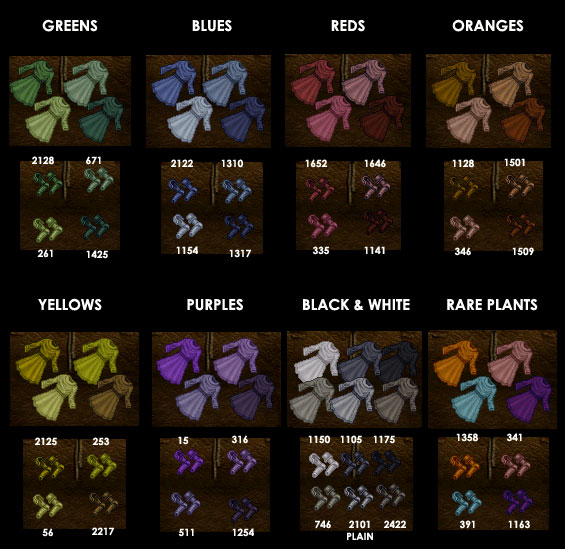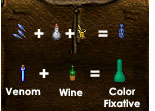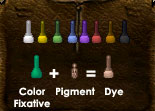Difference between revisions of "Staining"
(New page: {{tocright}} This system added with Stygian Abyss allows gardeners, cooks and alchemists to transform player grown plants and harvested berries into natural dyes. These items are consu...) |
Gmvalkyrie (Talk | contribs) (Added links) |
||
| Line 1: | Line 1: | ||
{{tocright}} | {{tocright}} | ||
| − | This system added with [[Stygian Abyss]] allows gardeners, cooks and alchemists to transform player grown plants and harvested berries into natural dyes. These items are consumables with limited charges. | + | This system added with [[Stygian Abyss]] allows [[Gardening|gardeners]], [[Cooking|cooks]] and [[Alchemy|alchemists]] to transform player grown [[Plants_&_Seeds|plants]] and harvested berries into [[Natural_Dye|natural dyes]]. These items are consumables with limited charges. |
To create usable dyes, the player will need to: | To create usable dyes, the player will need to: | ||
| − | # Create a color pigment using berries or decorative plants | + | # Create a color [[Plant_Pigment|pigment]] using berries or [[Decorative_plant|decorative plants]] |
# Add another color pigment to create a new hue (optional) | # Add another color pigment to create a new hue (optional) | ||
| − | # Create a usable dye by adding a color fixative | + | # Create a usable dye by adding a [[Color_Fixative|color fixative]] |
==Pigments== | ==Pigments== | ||
| − | Players with a minimum skill of 75 cooking or | + | Players with a minimum skill of 75 cooking or alchemy, first need the following items to make the pigments: |
| − | * A clipper (crafted by tinkers) | + | * A [[Clippers|clipper]] (crafted by [[Tinkering|tinkers]]) |
* Decorative plants | * Decorative plants | ||
| − | * An empty bottle | + | * An [[Empty_Bottle|empty bottle]] |
| − | * Mortar or Skillet | + | * [[Mortar_and_Pestle|Mortar]] or [[Skillet]] |
[[Image:Clippers_and_petals.jpg]] | [[Image:Clippers_and_petals.jpg]] | ||
| − | Players must cut decorative plants into small pieces using clippers. The resulting plant clippings will be placed in the player’s backpack and hued the same color as the decorative plant it came from. Then either grind the clippings (with a mortar) or boil them with a skillet. If successful, the empty bottle will be used up and a pigment bottle will be placed in the players backpack and hued the same color as the plant the pigment was extracted from. | + | Players must cut decorative plants into small pieces using clippers. The resulting [[Plant_Clippings|plant clippings]] will be placed in the player’s [[backpack]] and hued the same color as the decorative plant it came from. Then either grind the clippings (with a mortar) or boil them with a skillet. If successful, the empty bottle will be used up and a pigment bottle will be placed in the players backpack and hued the same color as the plant the pigment was extracted from. |
| − | The clippers will have | + | The clippers will have 3 options on the contextual menu, similar to that of the [[Shovel|shovels]], where players can set how they want to cut their plants: |
| − | * Set to cut reeds. (for basket weaving) | + | * Set to cut reeds. (for [[Basket_Weaving|basket weaving]]) |
* Set to clip plants. (to create pigments) | * Set to clip plants. (to create pigments) | ||
| + | * Set to cut topiaries. (to create [[Topiary|topiaries]]) | ||
Once the setting is selected, each time a player targets a plant when using the clippers, it will be cut in the appropriate shape. | Once the setting is selected, each time a player targets a plant when using the clippers, it will be cut in the appropriate shape. | ||
| Line 30: | Line 31: | ||
* The 6 base colors (yellow, green, blue, purple, red, orange) | * The 6 base colors (yellow, green, blue, purple, red, orange) | ||
* The 6 bright version of the 6 base colors | * The 6 bright version of the 6 base colors | ||
| − | * The 4 rare colors from the naturalist quest | + | * The 4 rare colors from the [[Naturalist_Quest|naturalist quest]] |
| − | For all of the above (except the plain seed) directly adding color fixative to these pigments will give a dye of the matching color. In the case of the plain seed, it will give a very light grayish hue. Mixing plain pigments with the normal color pigments will turn them into the matching bright color pigment. | + | For all of the above (except the plain seed) directly adding [[Color_Fixative|color fixative]] to these pigments will give a dye of the matching color. In the case of the plain seed, it will give a very light grayish hue. Mixing plain pigments with the normal color pigments will turn them into the matching bright color pigment. |
GM Alchemists or Cooks can obtain an additional 16 new hues. Using the black or white dyes on any normal or bright plant pigments will yield a unique new darker or lighter version of that hue. Those resulting hues cannot be mixed any further. Players can mix the normal and bright pigments to obtain a different color. In the picture below, top row is normal and bright color, bottom row is mixed with white and mixed with black. | GM Alchemists or Cooks can obtain an additional 16 new hues. Using the black or white dyes on any normal or bright plant pigments will yield a unique new darker or lighter version of that hue. Those resulting hues cannot be mixed any further. Players can mix the normal and bright pigments to obtain a different color. In the picture below, top row is normal and bright color, bottom row is mixed with white and mixed with black. | ||
| Line 38: | Line 39: | ||
[[Image:Staining_dyes.jpg]] | [[Image:Staining_dyes.jpg]] | ||
| − | + | The 4 rare plant colors from the Naturalist Quest (aqua, magenta, purple and fire) can also be turned to pigments but cannot be mixed, only made into dyes. Mixing the plain pigment with any other colors always yields the bright version of the other color. | |
==Color Fixative== | ==Color Fixative== | ||
These require 75+ skill cooking or alchemy. The ingredients required: | These require 75+ skill cooking or alchemy. The ingredients required: | ||
| − | * 1 venom vial from a silver serpent | + | * 1 [[Empty_Venom_Vial|venom vial]] from a [[Silver_Serpent|silver serpent]] |
| − | * 1 bottle of wine (from NPC vendors) | + | * 1 [[Bottle_of_Wine|bottle of wine]] (from NPC vendors) |
[[Image:Dye_ingredients.jpg]] | [[Image:Dye_ingredients.jpg]] | ||
| − | Using venom extracted from silver serpents (use the venom vial on a silver serpent to gather the silver serpent venom) and mixing it wine will create the color fixative (template 6027). The fixative must then be used on the pigment before it can be usable as dyes. | + | Using [[Silver_Serpent_Venom|venom]] extracted from silver serpents (use the venom vial on a silver serpent to gather the silver serpent venom) and mixing it with wine will create the color fixative (template 6027). The fixative must then be used on the pigment before it can be usable as dyes. |
[[Image:Dyes_complete.jpg]] | [[Image:Dyes_complete.jpg]] | ||
| Line 57: | Line 58: | ||
Players can use these dyes to rehue: | Players can use these dyes to rehue: | ||
| − | * Armor (leather and metal) | + | * [[Armor]] (leather and metal) |
| − | * Weapons | + | * [[Weapons]] |
| − | * Clothing and all items normally dyable with regular dye tub | + | * [[Clothing]] and all items normally dyable with regular dye tub |
* Bags, chests, boxes and crates | * Bags, chests, boxes and crates | ||
| − | * Spellbooks (including other non-mage spellbooks) & Runebooks | + | * [[Spellbook|Spellbooks]] (including other non-mage spellbooks) & [[Runebook|Runebooks]] |
| − | * Statuettes | + | * [[Statuettes]] |
| − | * Artifacts and magical items dyable with Tokuno dyes | + | * [[Artifacts]] and magical items dyable with Tokuno dyes |
| − | * Books | + | * [[Book|Books]] |
| − | * Jewelry | + | * [[Jewelry]] |
| − | These dyes essentially combine the ability of all currently available dye tubs and Tokuno dyes. | + | These dyes essentially combine the ability of all currently available dye tubs and [[Pigments_of_Tokuno|Tokuno dyes]]. |
[[Category:Stygian Abyss]] | [[Category:Stygian Abyss]] | ||
Revision as of 13:33, 12 May 2012
This system added with Stygian Abyss allows gardeners, cooks and alchemists to transform player grown plants and harvested berries into natural dyes. These items are consumables with limited charges.
To create usable dyes, the player will need to:
- Create a color pigment using berries or decorative plants
- Add another color pigment to create a new hue (optional)
- Create a usable dye by adding a color fixative
Pigments
Players with a minimum skill of 75 cooking or alchemy, first need the following items to make the pigments:
- A clipper (crafted by tinkers)
- Decorative plants
- An empty bottle
- Mortar or Skillet
Players must cut decorative plants into small pieces using clippers. The resulting plant clippings will be placed in the player’s backpack and hued the same color as the decorative plant it came from. Then either grind the clippings (with a mortar) or boil them with a skillet. If successful, the empty bottle will be used up and a pigment bottle will be placed in the players backpack and hued the same color as the plant the pigment was extracted from.
The clippers will have 3 options on the contextual menu, similar to that of the shovels, where players can set how they want to cut their plants:
- Set to cut reeds. (for basket weaving)
- Set to clip plants. (to create pigments)
- Set to cut topiaries. (to create topiaries)
Once the setting is selected, each time a player targets a plant when using the clippers, it will be cut in the appropriate shape.
Base Pigments & Mixes
By default, players can obtain pigments in 19 different colors directly from the plants:
- The plain color, Black and White mutant plants
- The 6 base colors (yellow, green, blue, purple, red, orange)
- The 6 bright version of the 6 base colors
- The 4 rare colors from the naturalist quest
For all of the above (except the plain seed) directly adding color fixative to these pigments will give a dye of the matching color. In the case of the plain seed, it will give a very light grayish hue. Mixing plain pigments with the normal color pigments will turn them into the matching bright color pigment.
GM Alchemists or Cooks can obtain an additional 16 new hues. Using the black or white dyes on any normal or bright plant pigments will yield a unique new darker or lighter version of that hue. Those resulting hues cannot be mixed any further. Players can mix the normal and bright pigments to obtain a different color. In the picture below, top row is normal and bright color, bottom row is mixed with white and mixed with black.
The 4 rare plant colors from the Naturalist Quest (aqua, magenta, purple and fire) can also be turned to pigments but cannot be mixed, only made into dyes. Mixing the plain pigment with any other colors always yields the bright version of the other color.
Color Fixative
These require 75+ skill cooking or alchemy. The ingredients required:
- 1 venom vial from a silver serpent
- 1 bottle of wine (from NPC vendors)
Using venom extracted from silver serpents (use the venom vial on a silver serpent to gather the silver serpent venom) and mixing it with wine will create the color fixative (template 6027). The fixative must then be used on the pigment before it can be usable as dyes.
Dyes
Each bottle of dyes has a total of 5 charges. Once used up, the bottle will be destroyed.
Players can use these dyes to rehue:
- Armor (leather and metal)
- Weapons
- Clothing and all items normally dyable with regular dye tub
- Bags, chests, boxes and crates
- Spellbooks (including other non-mage spellbooks) & Runebooks
- Statuettes
- Artifacts and magical items dyable with Tokuno dyes
- Books
- Jewelry
These dyes essentially combine the ability of all currently available dye tubs and Tokuno dyes.



